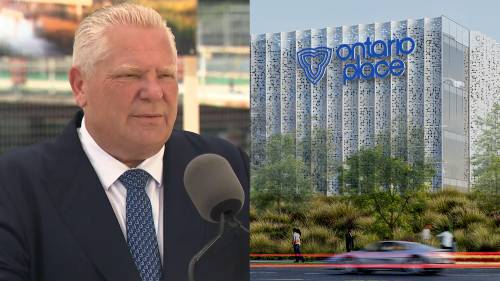The massive concrete structure isn’t just rising from Toronto’s shoreline – it’s stirring up a political tempest that may redefine Premier Doug Ford’s legacy on the waterfront.
Standing at Ontario Place yesterday, Ford unveiled plans for a five-storey, 2,100-space underground parking garage with an estimated $400 million price tag. “This investment will transform how families experience Ontario Place for generations,” Ford declared, flanked by Tourism Minister Neil Lumsden and Toronto Mayor Olivia Chow.
The announcement represents the latest chapter in the Ontario government’s controversial redevelopment of the once-beloved waterfront attraction that has sat largely dormant since 2012. But critics quickly pounced on what they see as misplaced priorities and questionable financing.
“We’re essentially building a $400 million monument to the automobile on prime waterfront property,” said Norm Di Pasquale of Ontario Place for All, a community group that has fought to preserve public access to the site. “That’s nearly $200,000 per parking space.”
The garage forms part of the province’s broader vision for Ontario Place, which includes a new science centre, water park, and spa facilities operated by Austrian company Therme. The provincial government maintains the redevelopment will revitalize 155 acres of waterfront property while creating thousands of jobs.
Mayor Chow, whose presence surprised many given her previous criticisms of the project, offered measured support. “While I continue to have concerns about aspects of this redevelopment, we must ensure Toronto residents have input on a project of this magnitude,” she said, noting that improved transit access remains a priority for the city.
But the timing has raised eyebrows across the political spectrum. With Ontario facing a $9.8 billion deficit according to the Financial Accountability Office’s November report, the province’s massive investment in parking infrastructure has become a lightning rod.
NDP critic Jessica Bell didn’t mince words: “Families are struggling with housing costs and healthcare wait times while this government pours concrete on the waterfront. Their priorities couldn’t be more backwards.”
The parking structure’s price tag represents a significant increase from earlier estimates. Internal documents obtained through freedom of information requests initially pegged the project at $260 million last year, raising questions about cost controls.
Infrastructure Minister Kinga Surma defended the investment, pointing to economic impact studies suggesting the revitalized Ontario Place could attract up to 3 million visitors annually. “This isn’t just about parking – it’s about creating the infrastructure necessary for a world-class destination,” Surma told reporters.
Environmental groups have raised alarms about potential impacts on Lake Ontario and nearby wildlife habitats. The Toronto Environmental Alliance noted the irony of promoting car infrastructure while claiming environmental benefits from the redevelopment’s green spaces.
“You can’t greenwash a parking garage,” said environmental advocate Diana Yoon. “This project will increase traffic congestion and emissions in an area already struggling with both.”
The province counters that the garage includes 200 electric vehicle charging stations and will reduce street parking pressure in surrounding neighbourhoods.
Transit advocates have questioned why equivalent investments aren’t being made in public transportation options. While the city has explored extending the TTC’s 509 Harbourfront streetcar, funding for transit improvements remains uncertain.
“For a fraction of this cost, we could create world-class transit connections to Ontario Place,” said transit expert Steve Munro. “Instead, we’re doubling down on car dependency.”
Recent polling shows Ontarians divided on the project. A Mainstreet Research survey found 48% support the redevelopment while 39% oppose it, with significant geographical splits – Toronto residents expressed the strongest opposition at 52%.
The political stakes couldn’t be higher for Ford, who has made the Ontario Place redevelopment a signature project. With construction already underway and provincial elections looming in 2026, the premier appears determined to see it through despite mounting criticism.
“People said we couldn’t get it done, but we’re proving them wrong,” Ford said, taking a not-so-subtle jab at previous governments that failed to revitalize the site.
For local residents like Maria Gallo, who brought her children to Ontario Place in the 1980s, the changes are bittersweet. “I have wonderful memories of this place as something accessible to everyone,” she said while watching the announcement from behind security barriers. “I worry we’re losing something precious in the name of progress.”
As construction equipment rumbled in the background, the contrast between Ford’s vision and public sentiment couldn’t have been clearer. The $400 million underground garage may be just the beginning of a political test that will define not just Ontario Place’s future, but potentially Ford’s political legacy as well.






